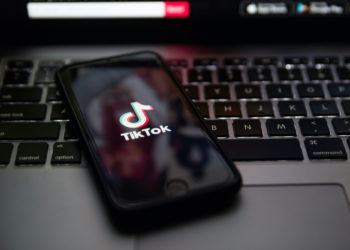
By Wyatt Otto, Content Manager With TikTok growing to become the most popular platform for traditional college students (age 18-22), more colleges are joining the platform to better connect to… Read More – So Your College is on TikTok, Now What?
Blog October 06, 2020
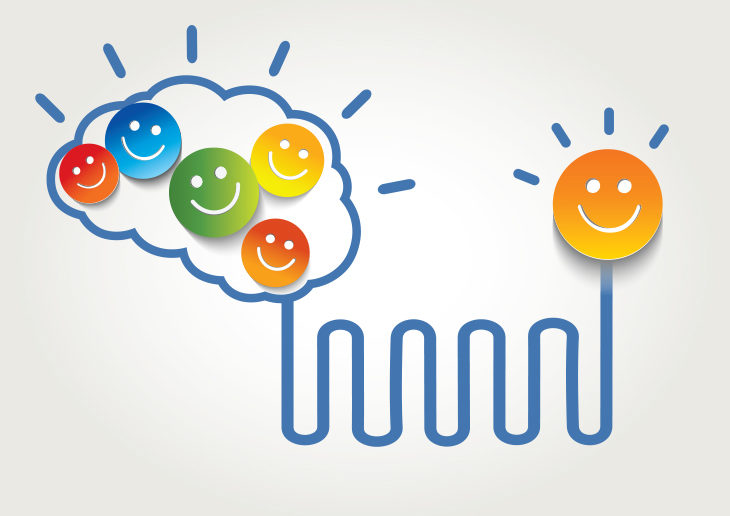
By Mary De Luca, VP, East Coast
Let’s take a trip back to high school chemistry. Remember learning about ions? Well, no need to dig into the recesses of your adolescent brain. Quick recap: They’re electrically charged atoms. The positively charged ones are called cations. OK. Enough of that. Right now, we’re all feeling a bit drained, living with constant uncertainty, kind of like we’re subjects in a bad science experiment. But what if we could recharge ourselves by producing our own ions of positivity?
There’s proven scientific power to positive thoughts. According to Psychology Today, “Thinking positive, happy, hopeful, optimistic, joyful thoughts decrease cortisol and produce serotonin, which creates a sense of well-being.” Besides making you more attentive and productive, it also stimulates your brain in ways that lead to more happy thoughts.
That’s quite a positive chemical reaction. Plus, neuroscientists have shown that optimism leads to better moods, perseverance, and better physical health—all things we’d like a bit more of during this pandemic.
So how can we ramp up the positive ions in our daily work and life? I’ve culled a few good sources, including my own team of optimists here at Interact, to give you 5 ions of positivity we can all readily adopt: Creat-ion, Meditat-ion, Connect-ion, Explorat-ion, and Appreciat-ion.
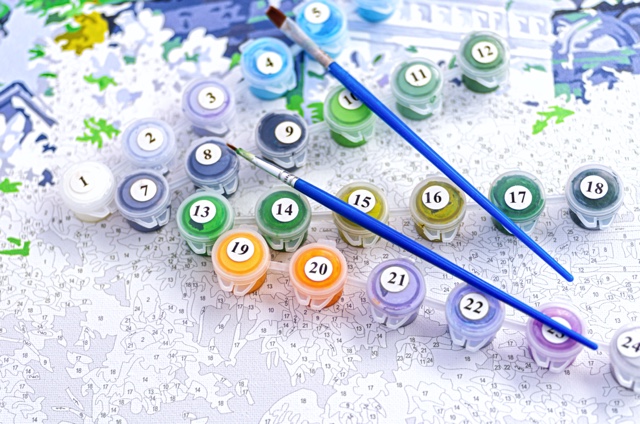
Wendy tapped this positive energy source by starting a paint-by-numbers kit. “It might sound silly, but it’s so rewarding,” she shares. “I’m on my third painting and I’m really enjoying it.”
Not silly at all, Wendy. In fact, a 2016 study by psychologists in New Zealand found that creative activity triggers an “upward spiral” of happy emotions and gives people a sense of purpose.
Rachel journals for about 15 minutes each morning, letting her thoughts flow freely. She’s reaping the happier, healthier benefits that psychologist James W. Pennebaker has proven through 40 years of research.
And Alana has created “things that make me happy” folders on her camera roll, Pinterest, and Instagram that she references whenever in need of a quick pick-me-up. “They are mainly cute, funny things like the apparently kid or an otter wearing a beanie, but they also include nice text messages I have received from friends and family.”
Alana is on to something, as scientists say gathering positive memories can enhance present happiness.
Focusing your attention on creative outlets, like crafting a memory book, doing a jigsaw puzzle, or cooking a recipe leaves no room for negative thoughts. So, dig out your Italian grandma’s focaccia recipe. Gather those supplies to paint your home office. Dust off those guitar strings and strum to your heart’s content.
Get those creative ions moving, which will likely lead you to some healthy…

Exploring a new subject or a familiar one more deeply can lead to a positive addiction.
According to Dmitry Golubnichy, founder of the 100 Happy Days Foundation and the #100HappyDays challenge, “As we learn, our brains produce happiness-inducing chemicals that govern a feedback loop that encourages us to continue to learn and improve,” Golubnichy explains.
Now is the perfect time to learn something new. Wendy started Spanish lessons. But this can be as easy as listening to whatever podcasts educate and inspire you.
Transporting yourself can also be as simple as stepping outside. Kym does this even on her busiest days. “Fitting in a short walk or taking the dogs to the river can boost my mood and clear my mind,” she says.
Studies show Kym is reaping the benefits of her outdoor excursions within just the first few minutes. So, no excuses for the rest of us! According to Samaritan Health Services, exploring the great outdoors can be a major boost to your outlook, stimulating feelings of revitalization, increased energy, and positive engagement. Plus, there’s the view! You may catch the sunrise, hear the birds, or witness the changing colors of fall.
Need more motivation? When the sun hits your skin, your body produces Vitamin D and signals your brain to produce more of the emotion-regulating chemical serotonin.
What are you waiting for? Get out there and let the sunshine in!
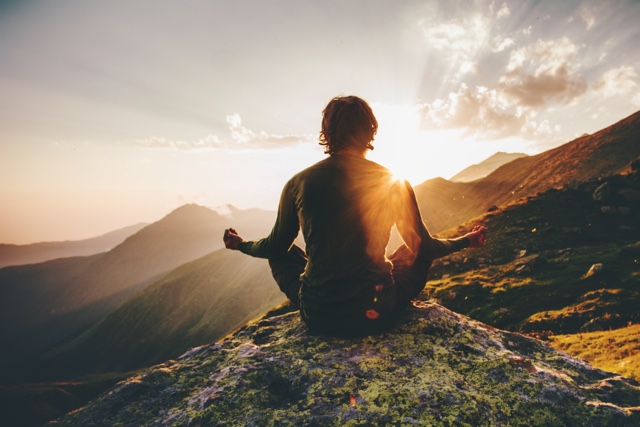
Outdoors or in, finding ways to quiet the negative noise, which we can all agree is much too abundant these days, can be quite therapeutic. Like many of us, when the pandemic hit and COVID-19 cases started to increase, Kym found herself absorbed by the 24/7 news cycle. “I wanted to stay informed, but it was overwhelming.”
She found a remedy in practicing 15-20 minutes of meditation before sleep. “It calmed my heart and slowed down my thoughts.” Michael and Angela make time to meditate, too. “It helps to turn off my brain,” says Angela.
According to Maryanna Klatt, professor of clinical family medicine at the Ohio State University Wexner Medical Center in Columbus, meditation is “taking a break from the continual mind chatter and continual partial attention we give most things in our lives. It’s not a clearing of the mind, but a focusing of the mind on something.”
If you’re not convinced meditation is for you, the good news is you might already be doing things that induce a mindful, meditative state. Any steady movement—walking, swimming, playing an instrument—can do the trick.

Do any activity with a group and your positivity ions will be supercharged! No doubt, we’ve all recognized during these days of six-foot-separation—regardless of where we fall on the introvert-extrovert scale—that we are in dire need of social connection.
That’s why Anthony, who has family back in his native England, so enjoys connecting on Zoom. “We share the positivity both ways—receiving and sending,” says Anthony. It’s also what prompted CEO Pam and her husband Fred to recently construct a deck around the tree in their front yard, where they gather friends for socially distanced dinner and conversation.
Spending time with people you like gives you a break from the other stressors of life. For Jamie, that’s her “kiddos,” who draw her into their imaginative world. “They live every day moment by moment, without dwelling on the details. Their smiles and silliness can spin around even the roughest of days for me!”
Need ideas for making connections? Consider joining a book club or some other group with shared interests. Even if it meets only once a month virtually, belonging to a group has been scientifically proven to boost happiness. So has being a mentor, volunteering, or being of service to others in some way.
For Hilda, considering why she works for Interact makes all the difference. “It’s helpful for me to keep in mind that the work we do—our mission—has a positive impact on others. This helps me focus on others, and not dwell on the negativity I may be facing.”
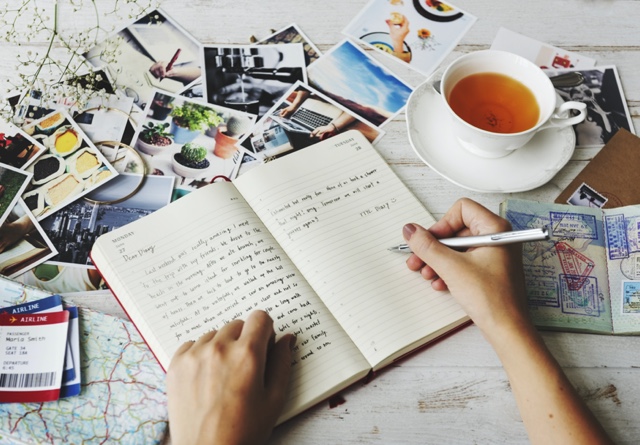
Taking stock of what makes you happy, according to the American Heart Association, is actually good for your immune system. Counting your blessings, instead of sheep, can even lead to a better night’s sleep!
“Gratitude allows me to be in the moment—live in the present—and appreciate my current circumstances, no matter what they are,” says Hilda.
“I really do try to look at the glass half full,” adds Sara.
For Angela, that means keeping a list of “The Little Things That I Love,” which she adds to or reads whenever she’s feeling stressed.
Rachel took her father’s advice and starts her day with a gratitude journal. “It’s a great way to overcome the natural negativity bias that we have, and I know mine can get on overdrive during these difficult times. I try to write five simple things that I’m grateful for, and this helps me to feel more present and grounded in my body.”
Ok, so expressing more gratitude is all well and good, but what about those moments when you just want to indulge in a bit of instant self-gratification? Granted, not the positive kind of ion I’ve been writing about, but admittedly the kind I’ve been drawn to of late. Hint: wine and chocolate.
As one of my favorite Wall Street Journal columnists, Jason Gay, put it: “Life is routinely beautiful, but I think we can all concede that, at the moment, life is fairly meh.” Some days, “meh” may be putting it mildly.
Nonetheless, Jason gave me a glimmer of hope in a recent column, which shared good news from a recent study at the University of Zurich and Radboud University in the Netherlands concluding that “short-term, ‘hedonistic’ pleasures lead to at least as much happiness as longer-term accomplishments.” For Jason, that translated into an acknowledgement that “it’s OK to occasionally lie on the couch and eat chips and whipped cream from a bottle.”
After my much-needed LOL moment reading Jason’s column, I made a no-judgment-zone beeline for the pantry and poured myself a self-satisfying bowl of salty potato chips. Finally, some science to free us from the guilt of enjoying life’s simple pleasures.
In the quest for positivity during the pandemic, seriously, that’s the best news I’ve heard in a long time.
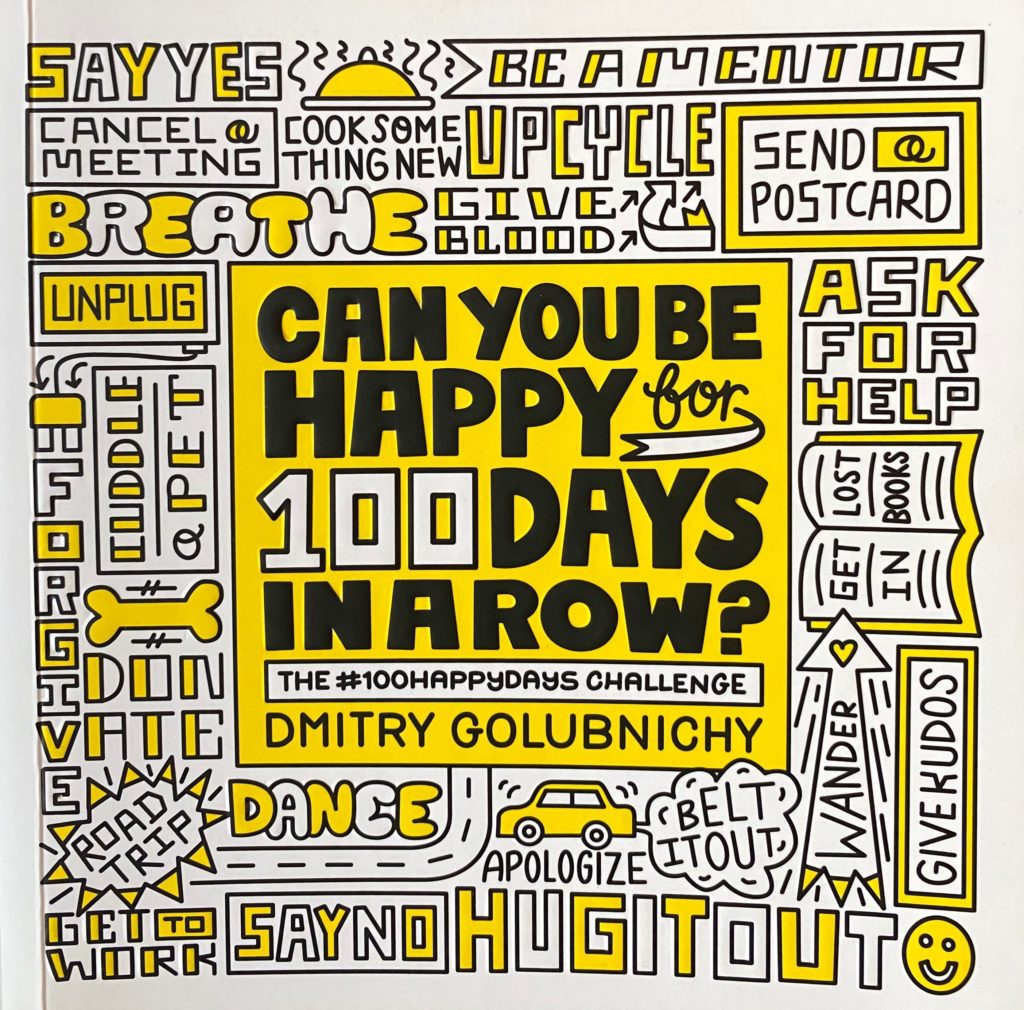
If you’re up for taking on the #100HappyDays challenge with me, message me on LinkedIn. We’ll start a #100HappyDays challenge group to encourage each other to get going and keep going. To see what we’re in for, visit 100happydays.com. I’ve been wanting to do this for a while and realize I need a support group to finally make it happen. No need to wait for 2021. Join me now for 100 happy days!

A heartfelt appreciation to my Interact colleagues, who contributed to this blog (in order of mention): Wendy Ferestad, account coordinator; Rachel Rosen-Carroll, copywriter; Alana Villamez, director of communications; Kym Browning, VP, client services; Michael Mahin, Ph.D., senior copywriter; Angela Carollo, VP, marketing and strategy; Anthony Jones, VP, operations and technology; Pam Cox-Otto, Ph.D., CEO, principal; Jamie Wagner, executive director, Media Prefs; and Sara Sampey, lead videographer.
And I’d be remiss if I didn’t thank my daughter Marisa, a recent biochemistry grad and aspiring physician, whose positive energy and kindness brightens my every day. She’s also the one who gave me Dmitry Golubnichy’s book, Can You Be Happy for 100 Days in a Row? The #100Happydays Challenge.

By Wyatt Otto, Content Manager With TikTok growing to become the most popular platform for traditional college students (age 18-22), more colleges are joining the platform to better connect to… Read More – So Your College is on TikTok, Now What?

We’re all familiar with she/her and he/him pronouns, but there’s a third set of pronouns that we need to become more familiar with, and that’s singular they/them pronouns.

In an interview with Paula Di Dio, Ph.D. in Latin American literature and cultural studies and senior director of communications & research strategist at Interact, we break down how best to communicate with Latino and Hispanic students.
Read More – Writing and Marketing to Latino and Hispanic Students